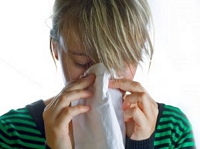Mold Symptoms
Common Mold Symptoms
If you have a mold problem in your home then you'll continually be breathing in mold spores from the air. These spores trigger allergic reactions like sneezing and a runny nose. The spores can also irritate areas of the body such as the throat and nose as well. Overall, the main symptoms mold causes are:- Sneezing and coughing
- Nasal congestion
- Sore throat
- Irritated skin
- Sore eyes
- Sinus problems
- Breathing difficulty
- Dizziness
- Headaches
- Trouble concentrating
- Feeling faint
- Hair loss
- Diarrhea
- Tiredness
- Fatigue
- Nausea
Some molds are toxic, such as Stachybotrys chartarum and Aspergillus niger, and can cause toxic symptoms. A list of the toxic symptoms caused by Stachybotrys chartarum is at the Black Toxic Mold Symptoms page.
Sneezing And Coughing Symptoms From Mold Exposure

Even if you don't have a mold allergy though, mold spores can still make you sneeze by irritating your nose and throat. Inhaled mold spores irritate the mucus membranes along the air passages. Some of the mold spores even lodge in the lungs and airways leading to chronic coughing and sneezing.
Nasal Congestion Symptoms From Mold Exposure
A blocked or runny nose is another common symptom to mold. Nasal congestion is caused by the immune system creating mucus to trap mold spores and prevent them entering the body. Mold spores irritating the mucus membranes in the nose can also cause nasal congestion.If you suffer symptoms like nasal congestion, sneezing and coughing you might think that you have a cold. But if you have mold in your home it could be the real cause of these allergic symptoms. Are your symptoms long term, like a cold all year round even in hot weather, for example? If so, it's a strong sign that these symptoms are caused by a mold problem.
Sore Throat Symptoms From Mold Exposure
Another symptom mold causes is a dry or sore throat. Like the last two symptoms, a sore throat can be caused by the mold spores irritating mucus membranes in the throat.The immune system might create a build up of mucus in the throat because of mold. This allergic reaction helps trap mold spores in the mucus before the spores can get into a person's lungs.
Itchy Skin Symptoms From Mold Exposure
When skin comes into contact with mold growth or with mold spores in the air it can become irritated and itchy. The symptoms mold causes to the skin include itchiness, redness and skin rashes.Sore Eyes Symptoms From Mold Exposure
Mold spores in the air irritates the eyes. When mold spores come into contact with the eyeballs it can make them sore, red, bloodshot or watery.Sore eyes are also a symptom of mold allergy and so breathing in mold spores can make a person's eyes red and sore too. A person might have sore red eyes just after they've woken up if they've been breathing in mold spores, even though no mold spores were in contact with their eyeballs.
Sinus Symptoms From Mold Exposure
When a person breathes in mold spores some pass into the sinuses and cause irritation. Some spores even become lodged in the sinuses. If a person is allergic to mold mucus builds up in the sinuses in response. Mold spores in the sinuses can lead to sinus congestion or blocked sinuses, sinus headaches and even sinus infections.Breathing Difficulty Symptoms From Mold Exposure
Breathing in mold spores can cause breathing problems like wheezing and shortness of breath. The more allergic and sensitized to mold a person is the worse their breathing problems will be.Prolonged exposure to mold can even lead to asthma eventually. Breathing in mold often triggers an asthma attack for asthmatics.
How Mold Causes Allergic Symptoms
Most of the symptoms mold causes are actually allergic reactions that are triggered when people breathe in mold spores.When people are in an environment with mold they inevitably breathe in some of the mold spores in the air. Once mold spores are in the body the human immune system tries to defend against them through allergic reactions such as sneezing and creating mucus.
Mold spores themselves don't actually harm the human body. It is our own immune systems which cause the symptoms.
Not everyone is born with an allergy to mold. However the more a person is around mold the more sensitized they become. Eventually any person can end up becoming allergic to mold if they are around it for long enough.
More About Irritant Symptoms From Mold Exposure
Besides allergic reactions, mold spores can cause irritant symptoms. These affect even people who don't have mold allergies. The irritant symptoms, though, are similar to symptoms caused by mold allergies such as irritation of the air passages and sore eyes.Treating Mold Symptoms
If you are suffering mold symptoms the best thing to do is get rid of the mold that's causing them. The Mold Removal page provides a complete guide to how to remove mold in your home.If you think you might have a mold problem but can't find the mold visit the Mold Inspection page for a guide to finding mold in your home. The Mold Testing page can also be useful if you want to test for mold to find out for certain whether or not you have any in your home.
HEPA vacuuming your home can also help with mold symptoms and allergies since HEPA vacuums remove spores and other allergens from the home.


